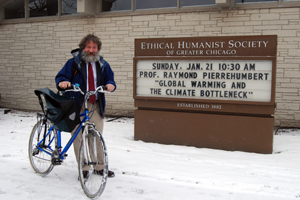![[Chronicle]](/images/sidebar_header_oct06.gif)
Vol. 26 No. 11
current issue
archive / search
contact
Past Opine interviews:
Lauren Berlant
Stephen Berry
John Boyer
David Cohen
Jerry Coyne
John Cunningham
Richard Epstein
John Frederick
Henry Frisch
Austan Goolsbee
Bernard Harcourt
Greg Jackson
Martin Marty
Martha Nussbaum
Raymond Pierrehumbert
José Quintáns
Jan-Marino Ramirez
Saskia Sassen
William Sewell
Herman Sinaiko
Geoffrey Stone
Cass Sunstein
Simon Swordy
Opine: Raymond Pierrehumbert
 Raymond Pierrehumbert | |
This week, Raymond Pierrehumbert, the Louis Block Professor in Geophysical Sciences and the College, is of the opinion . . .
What book should every person read and why?
Dr. Faustus, by Thomas Mann. It’s a novel about many things, but among others about the paralyzing and insidious nature of despair. With so many seemingly insurmountable problems facing the world, it is necessary to keep in mind how important it is to fight off despair. Ideally, one should read Marlowe’s Faust first, for general background, and perhaps Goethe’s Faust (Part 1).
If you could meet any scholar, author, composer, musician or entrepreneur—dead or alive—who would it be and why?
I would like to meet the first bacterial “entrepreneur” who, billions of years ago, figured out how to combine Photosystem I and II and make oxygen out of water. The circumstances surrounding this event and its effect on the Earth remain deeply shrouded in mystery. Failing that, I would like to meet Aristotle and find out what he wrote about comedy in the lost second book of Poetics. I think comedy is very important. While we’re at it, we could have a good chat about his Meteorologica, which I think is his most mature and enduring scientific writing.
Among the complex moral and political issues that affect humanity, which do you believe will never be resolved and why?
Where do ethics come from—that is, what does it mean to be good? This is particularly important given that humankind is now a force of more than geological proportions regarding the future of the Earth. We cannot escape the responsibility for deciding what kind of environment we will leave for future generations of our descendents and other of Earth’s species on into eternity. We still need to answer the question, “What is the Earth for?”
If politicians had to pass an exam before they were allowed to serve in public office, what question would you add to the test?
Explain why every coal-fired power plant built from now on, worldwide, should use IGCC (Integrated Gasification Combined-Cycle) technology. Explain what combination of regulations, carbon taxes and cap-and-trade schemes would best achieve this goal, with particular attention to bringing China and India into the process. For extra credit, describe options for sequestering the waste carbon dioxide stream from such plants, and the economics of sequestration.
If you could choose any three University professors and give them a one-year sabbatical together to solve a problem, develop a theory or make a discovery, who would they be and what task would you assign them?
I’d like to get Doug MacAyeal, Tom Witten and Sid Nagel together for a year to think about how to make theories of the effect of ice fracture on meltdown of glaciers. It’s one of the frontiers in climate change, and one of the areas where nature seems to be surprising us with more dramatic responses than we have been anticipating. Just for the heck of it, I’d like to throw in David Bevington, so they can all talk about Shakespeare when the going gets rough. “Oh that this too, too sullied glacier could melt, rend and resolve itself into a dew . . .”
Think of a renowned scholar from the past who added great value to your area of study. What would this person think of the advances that recently have been made in this field?
Jean-Baptiste Joseph Fourier, who was the first to recognize the problem of planetary temperature as a fundamental problem in physics. I think he would be very intrigued to learn which gases in the atmosphere are responsible for the greenhouse effect, and the way quantum theory enters into the very habitability of the Earth.
What building on campus do you think is the most interesting architecturally and why?
Harper Library—I’m a sucker for the monastic echoes of Old Academe, even if our traditional architecture is frankly derivative. More heretically, the dorms commonly referred to as “Barney,” “Barbie,” and “BigBird,” which are outright jarring but whose splash of color actually starts to become endearing after a while.
Will a liberal arts education remain relevant to students in our increasingly technological society? Why or why not?
Yes, because science can answer the “what” or “how” questions, but not the “why” questions. It can tell you whether polar bears are likely to become extinct as a result of global warming, but it can’t tell you why you should care.
How will the next generation of scholars—today’s students—change your field in the decades to come?
The ability to find out things about the atmospheres and climates of extrasolar planets, and increasingly detailed probes of the present and past climates of solar system planets, will enormously enrich our thinking about the myriad ways to put together a habitable planet. Increasing understanding of assembly of prebiotic molecules and the evolution of early life on Earth will finally enable us to resolve the question of whether there’s likely to be anybody else out there, or only green slime, or maybe not even that.